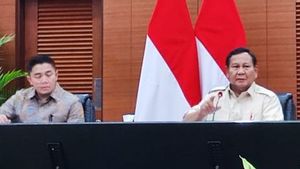JAKARTA The target of achieving Indonesia Gold 2045 is predicted to face tough challenges, one of which is the increasing number of sandwich generations.
Indonesia will receive a demographic bonus in the next 10 to 20 years. The peak occurred in 2045, where the government called it the Golden Indonesia period, as well as the 100th anniversary of independence.
However, all the advantages that can be obtained from the demographic bonus are threatened not optimally due to the phenomenon of sandwich generation or sandwich generation.
"On the one hand, they are in the productive age group, but on the other hand they can be hampered from being productive because of the burden to bear," said Statistical Polytechnic Lecturer Margaretha Ari Anggorowati, citing Kompas.
The sandwich generation is a term for productive people who have multiple roles. In addition to being obliged to meet their own needs and this family, they must also fulfill their parents' lives at the same time. This condition is likened to a sandwich filling that is squeezed between two layers of bread.
According to data from the Central Statistics Agency (BPS), Indonesia's population in 2022 will reach 275.77 million people. Of this figure, the number of people with productive age (15-64 years) reached 69 percent while the population of non-productive age reached 30.74 percent.
Those including non-productive age populations are those who have not reached the productive age (0-14 years) as much as 24 percent, and unproductive age populations (65 years and over) reach 6.74 percent.
Meanwhile, the percentage of the sandwich generation in Indonesia according to a poll conducted by Litbang Kompas on August 9-11, 2022, of 504 respondents from 34 provinces in Indonesia showed 67 percent of respondents including the sandwich generation group.
The sandwich generation data is then divided into several levels of economic groups, ranging from the top to the bottom. The sandwich generation from the upper economic family was 2.7 percent, the upper middle economy was 16.3 percent, the lower middle economy was 44.8 percent, and the lower economy was 36.2 percent.
The burden borne by the sandwich generation can be an obstacle to optimizing demographic bonus opportunities.
The demographic bonus itself can be seen from the dependence ratio or dependence ratio, namely the comparison of the population of non-productive age with the number of people of productive age.
BPS said, in 2022 the dependence ratio rate will reach 44.67 percent. In other words, around 44-45 per 100 non-productive people in Indonesia depend on those aged productively.
Meanwhile, according to the results of the 2020 Population Census, the projection for the dependence ratio in 2025 is 47.7 percent. This figure had dropped to 46.9 percent in 2030, but rose again to 47.3 in 2035.
"The ratio of dependence until 2035 is a great opportunity for higher productivity than the Indonesian population. However, the great opportunity of the demographic bonus can be hampered by the large burden of the sandwich generation," said Margaretha.
The high number of sandwich generations is caused by many factors, one of which is the unpreparedness of the Indonesian people to enter retirement.
Rista Zwestika, a financial planner expert from PINA Indonesia, revealed data in which 90 percent of Indonesians are not ready to enter retirement for various reasons, including not having sufficient funds (86 percent), worrying about relying on family (54 percent), worrying about running out of money in retirement (77 percent), and worrying about raising expenses for health (83 percent).
According to Rista, if the millennial generation is now not good at managing finances, it will create a sandwich generation.
"Likewise, Gen Z, which is currently a little healing, is consumptive because it follows the lifestyle, this will create the name of the sandwich generation," said Rista.
As is well known, this sandwich generation chain has the potential to continue to rotate if it is not stopped from now on. The current productive age group is threatened with not being able to bring out its best potential if it has to be part of the sandwich generation group.
That way, in 2040 when the millennial generation reaches unproductive age, they will actually depend on the generation below them.
This young person who is now 16-20 is the one who will be threatened with becoming a sandwich generation in 2045 if there is no strengthening of economic capabilities from now on.
For this reason, the circle or circle of sandwich generation must be cut off through collaboration with various parties.
Margaretha said the government needs to provide training and education programs to the sandwich generation, provide social security, financial services, and health to the elderly, as well as provide access to education and health for children and adolescents who are dependents of the sandwich generation.
SEE ALSO:
With this assistance, it is hoped that the burden of the sandwich generation will decrease, so that they can be more productive and highly competitive in the demographic bonus era. This strategy will help to realize Indonesia Gold 2045, coinciding with 100 years of independence of the Republic of Indonesia.
If Indonesia is able to convert demographic bonuses into welfare bonuses, then at the end of the demographic bonus period it will be marked by high per capita income. On the other hand, the number of sandwich generations can be reduced.
The English, Chinese, Japanese, Arabic, and French versions are automatically generated by the AI. So there may still be inaccuracies in translating, please always see Indonesian as our main language. (system supported by DigitalSiber.id)














